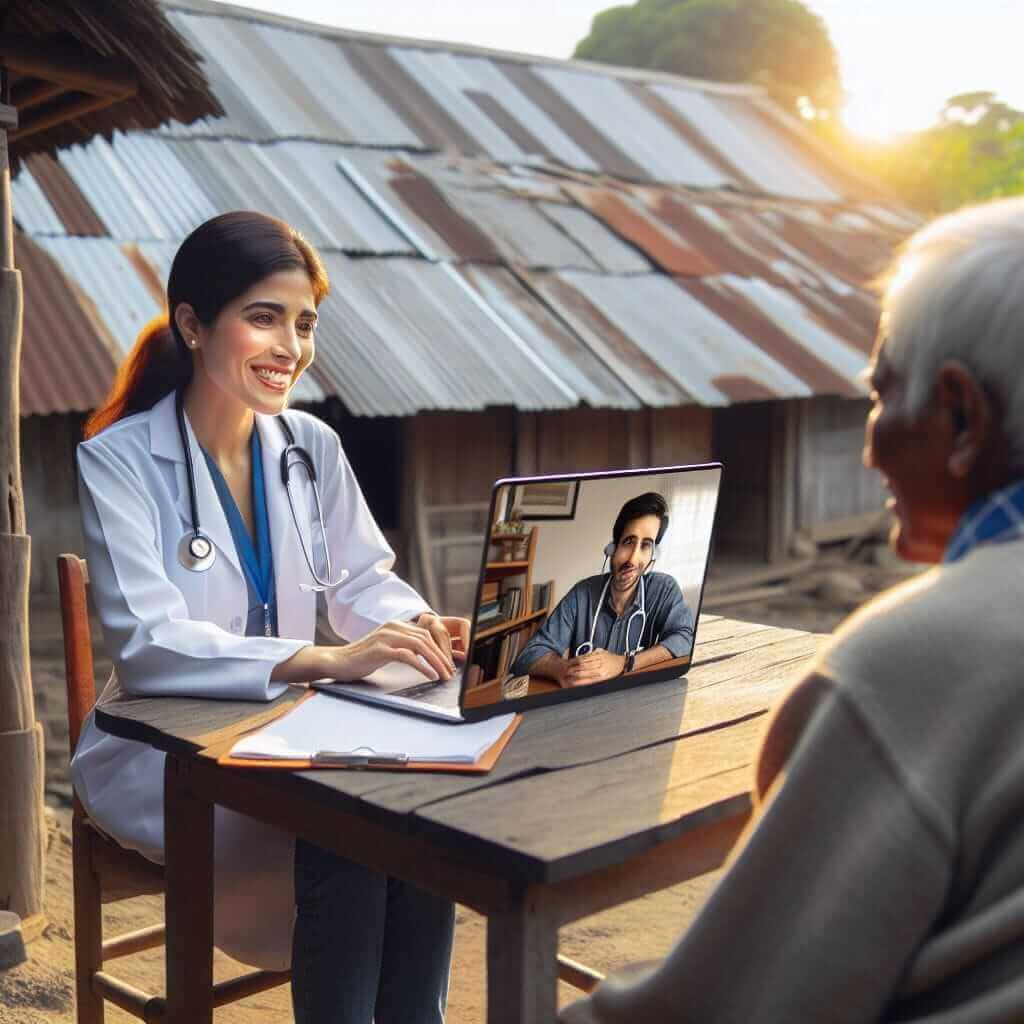Telemedicine, defined as the remote diagnosis and treatment of patients using telecommunications technology, has been a growing trend in modern healthcare. In recent years, it has garnered substantial attention, especially in the context of rural healthcare improvement. As a prevalent topic in various discussions, including academic examinations such as the IELTS Writing Task 2, telemedicine holds critical importance. Notably, its relevance has heightened in recent IELTS tests, indicating its significance and potential recurrence.
Additionally, other related themes such as the impact of technological innovation on healthcare access, the role of community-based healthcare, and the influence of technology on healthcare innovation have also been prominent in past IELTS exams.
Selected Past IELTS Question:
Topic: The impact of telemedicine on rural healthcare
Sample Question: “Discuss the advantages and disadvantages of telemedicine for rural healthcare patients.”
This topic has appeared in various forms, either as agree/disagree, advantages/disadvantages, or discussion essays. Below, we will focus on the “advantages and disadvantages” essay format.
Main Content
Essay Prompt:
Discuss the advantages and disadvantages of telemedicine for rural healthcare patients.
Question Analysis:
Task Requirement:
- Identify and discuss the benefits of telemedicine specifically for rural areas.
- Address the drawbacks that rural patients might face when accessing telemedicine services.
- Provide examples and relevant evidence to support points.
Instruction Words:
- “Discuss”: Requires a balanced review of both positive and negative aspects.
Focus of Topic:
- Rural healthcare improvement through telemedicine.
Sample Essay:
Telemedicine, which involves the use of telecommunications technology to provide healthcare remotely, has significantly impacted rural communities. While telemedicine offers numerous advantages that enhance healthcare accessibility, it also presents certain drawbacks that need to be addressed. This essay will discuss both the benefits and disadvantages of telemedicine for rural healthcare patients.
One of the primary advantages of telemedicine is enhanced access to healthcare for rural inhabitants. In many remote areas, access to quality healthcare services can be limited due to a shortage of medical professionals and facilities. Telemedicine bridges this gap by allowing patients to consult with specialists without the need for lengthy travel. For instance, farmers or those living in isolated communities can receive timely medical advice and treatment plans through virtual consultations, which can be crucial in emergency situations.
Moreover, telemedicine provides significant cost savings for both patients and the healthcare system. Rural patients often incur high travel costs to visit healthcare facilities. By utilizing telemedicine, they can avoid these expenses, potentially leading to more frequent and proactive health management. Additionally, healthcare providers can serve a larger patient base remotely, resulting in operational cost reductions and more efficient resource allocation.

Despite these advantages, several disadvantages of telemedicine exist, particularly concerning technological accessibility and the quality of care. Firstly, rural areas may suffer from insufficient internet connectivity or lack of digital literacy among the population. This technological barrier can hinder the smooth implementation of telemedicine services. For example, unreliable internet can disrupt virtual consultations, making accurate diagnosis and treatment challenging.
Secondly, telemedicine may not always provide the same level of care as in-person visits. Physical examinations are often indispensable in diagnosing certain conditions accurately. For instance, a doctor cannot palpate an abdomen or listen to a patient’s heart and lungs over a video call. Therefore, critical nuances in a patient’s physical condition might be overlooked, potentially leading to misdiagnoses or suboptimal treatment plans.
In conclusion, telemedicine undoubtedly offers significant benefits by improving healthcare accessibility and reducing costs for rural patients. However, challenges such as inadequate technology infrastructure and limitations in the quality of remote consultations must be addressed to maximize its efficacy. Overall, the integration of telemedicine in rural healthcare is a promising development that requires careful consideration of both its advantages and limitations. (355 words)
Key Considerations When Writing This Essay:
- Vocabulary and Cohesion: Use varied vocabulary to discuss both advantages (e.g., enhanced access, significant cost savings) and disadvantages (e.g., technological barriers, limitations in care quality). Ensure coherent connections between ideas.
- Grammar: Use complex sentence structures, conditionals, and passive voice where appropriate to demonstrate higher grammatical range and accuracy.
- Evidence and Examples: Back up points with relevant examples to lend credibility to arguments.
Important Vocabulary:
- Telemedicine: (n) /ˌtel.əˈmɛd.ɪ.sɪn/ Use technologies to diagnose and treat patients remotely.
- Accessibility: (n) /ɪkˌsɛs.ɪˈbɪl.ɪ.ti/ The quality of being able to be reached or entered.
- Consultation: (n) /ˌkɒn.sʌlˈteɪ.ʃən/ The process of seeking advice or opinion from someone, esp. a professional.
- Digital Literacy: (n) /ˈdɪdʒ.ɪ.təl ˈlɪtərəsi/ The ability to effectively use digital tools and platforms.
- Operational Costs: (n) /ˌɒpəˈreɪʃənəl kɒsts/ Expenses associated with running a business or organization.
- Diagnosis: (n) /ˌdaɪ.əɡˈnoʊ.sɪs/ The identification of the nature of an illness or other problem.
- Misdiagnosis: (n) /ˌmɪs.daɪˈɒɡ.nəʊ.sɪs/ Incorrect identification of an illness or problem.
- Nuance: (n) /ˈnjuː.ɑːns/ A subtle difference in meaning or opinion.
Conclusion
In summary, telemedicine has profoundly transformed rural healthcare by improving access and reducing costs. However, challenges such as technological barriers and potential care quality issues must be carefully managed. Given its increasing importance, similar topics may frequently appear in future IELTS exams. Future candidates may be asked to explore related questions such as the role of telemedicine in pandemic response, or the sustainability of telemedicine in urban healthcare. By comprehensively understanding this topic, candidates can prepare effectively for various essay prompts.